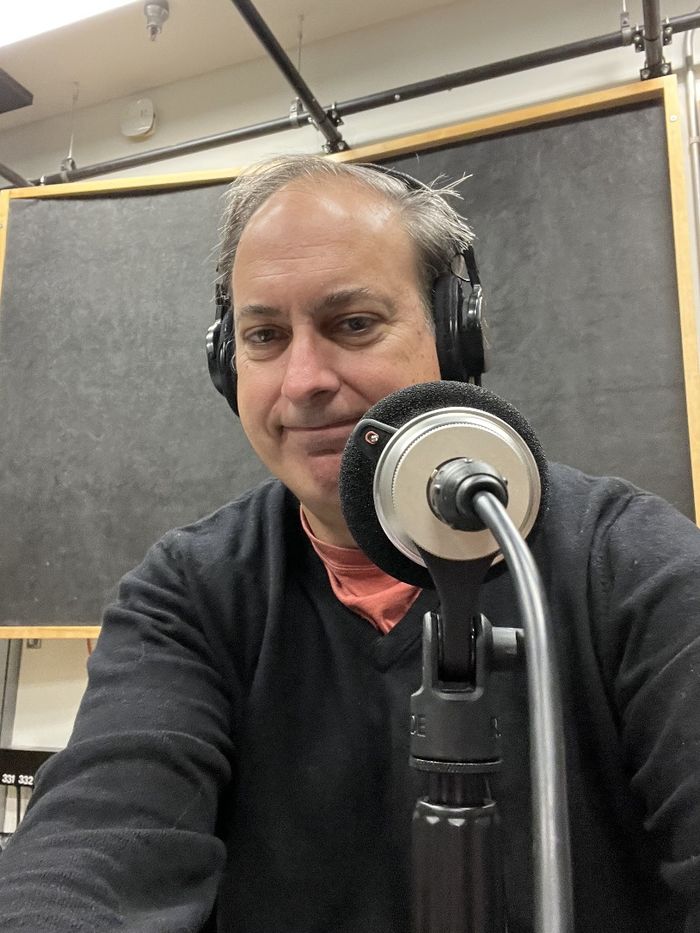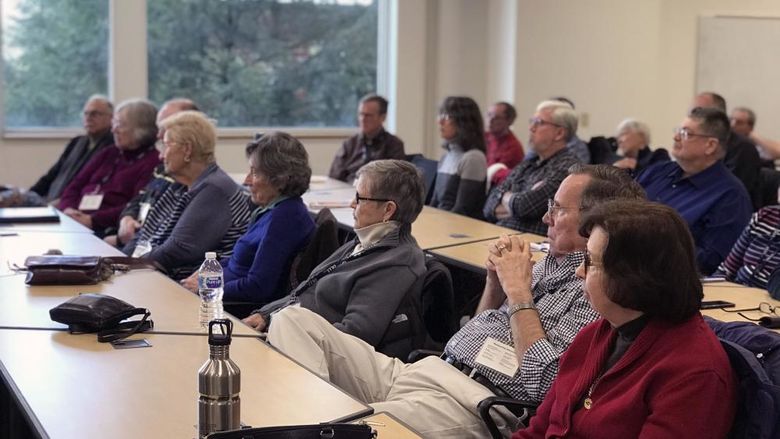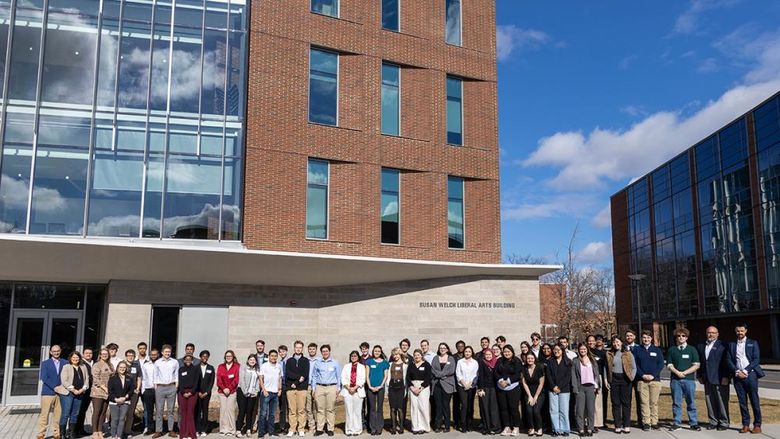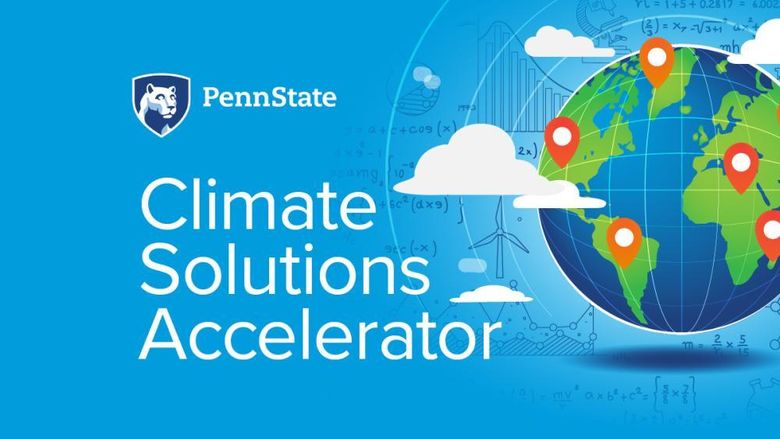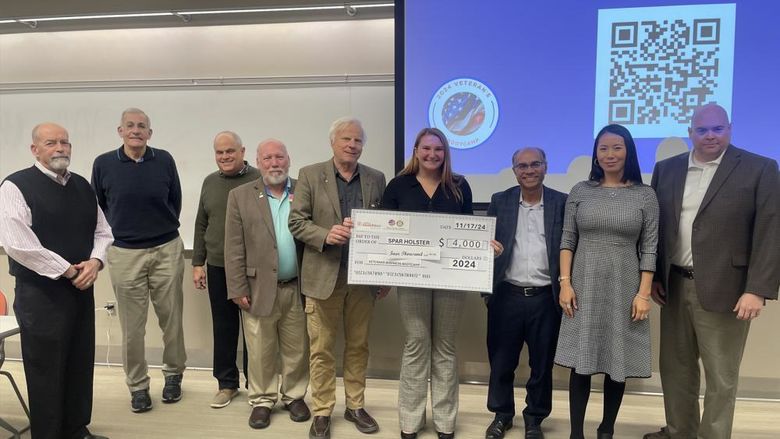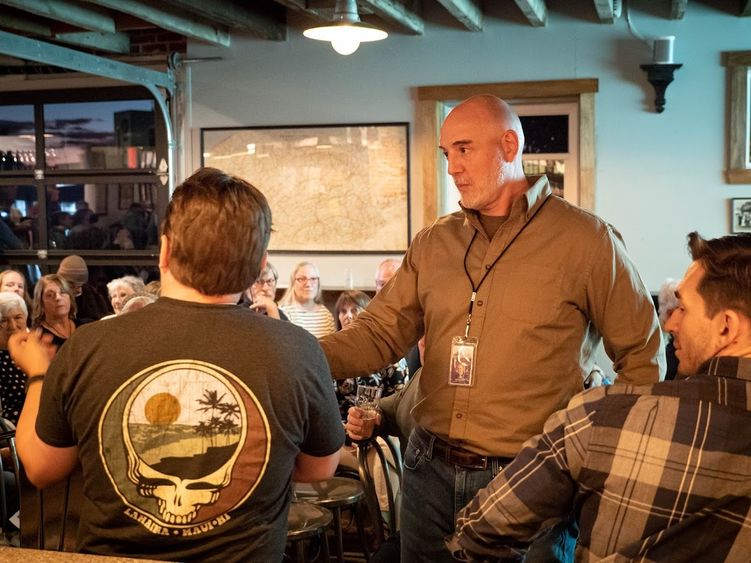
Tim Lambert, journalist and special projects editor for WITF in Harrisburg, Pennsylvania, meets with members of the community during a station outreach initiative.
UNIVERSITY PARK, Pa. — As news headlines can often feel like a daily barrage of angry voices, flashing lights, and intrusive sound, many audiences report an escalation in their own anger, changing the channel or tuning-out altogether. WPSU is hoping to help listeners who are seeking the day’s news to cut through the chaos with “News Over Noise,” a podcast produced as part of Penn State’s News Literacy Initiative.
“We think democracy depends on vibrant journalism that is independent of politics. Yet, our capacity to solve problems together is hindered by the amount of attention-grabbing and divisive noise that floods our media system,” said Matt Jordan, associate professor of media studies in the Donald P. Bellisario College of Communications at Penn State, director of the News Literacy Initiative, and co-host of “News Over Noise.” “This has led to the growth of news avoidance, as people protect themselves from the frustration and burnout that is often generated by this noise. We would like to help people identify what good public interest journalism looks and sounds like.”
In 2022, Penn State launched the News Literacy Initiative in conjunction with University Libraries, Student Affairs, Penn State Harrisburg, two academic colleges, Penn State Outreach and WPSU, to provide students — as well as residents across the commonwealth — with resources and support as they attempt to avoid misinformation and find quality news sources.
“We think democracy depends on vibrant journalism that is independent of politics. Yet, our capacity to solve problems together is hindered by the amount of attention-grabbing and divisive noise that floods our media system.”—Matt Jordan , associate professor of media studies in the Donald P. Bellisario College of Communications at Penn State, director of the News Literacy Initiative, and co-host of the “News Over Noise” podcast
“The News Literacy Initiative is about promoting better literacy about news media in general, so that people are more intentional about the information that they consume, and less gullible about the misinformation they believe,” said Jordan. “Whether it’s misinformation about public health or politics, it is a major crisis for democracy right now. We aim to help with that, and the 'News Over Noise' podcast is part of our outreach effort in this mission.”
Jordan said one of the podcast episodes focuses on the importance of local news and how the erosion of it can become a major problem in a democracy.
“Local news is often the best kind of news in a democracy because it covers things where people understand the context and the stakes as it relates to their everyday life,” said Jordan. “As our national media has focused our attention on things that we only relate to abstractly, the press has begun to fail communities in its role as a watchdog.”
Tim Lambert, special projects editor for WITF in Harrisburg, Pennsylvania, and guest of the podcast episode “What Happened to Local News,” said budget restraints limit the number of reporters in the field covering local meetings, researching political candidates, and connecting the dots on the decisions that will affect a communities’ everyday life.
“No one is seeing reporters, knowing reporters like they did in the past, and it is hard to establish communication and bonds of trust within communities,” said Lambert. “Many people have a lack of understanding of basic civics, how laws are passed, how the voting system in our democracy works, and it can lead to the consumption of and vulnerability of believing misinformation. WITF created what we call ‘News and Brews’ where we go out to local bars and restaurants to talk to people and find out what their concerns are, as well as introduce them to what being a journalist looks like.”
To hear more from Lambert and access other “News Over Noise” podcast episodes — including “News Avoidance and Why It Matters,” “What’s Missing from Economic News,” “The Danger of the ‘News Finds Me’ Mentality,” “Social Media: Friend or Foe of the News Cycle?” — listen online or find it on Apple and Google podcasts.
"Many people have a lack of understanding of basic civics, how laws are passed, how the voting system in our democracy works, and it can lead to the consumption of and vulnerability of believing misinformation."—Tim Lambert , special projects editor for WITF in Harrisburg, Pennsylvania
Listen to Jordan and Leah Dajhes, co-hosts of “News Over Noise,” discuss the podcast and the News Literacy Initiative on the latest episode of the “Democracy Works” podcast, “Separating News from Noise.”
As part of the News Literacy Initiative, WPSU also is offering access to the following webinars for educators. Registration is free and participants will receive Act 48 credits and a free one-year subscription to The New York Times and The Wall Street Journal:
“Does News Find Me?”
4-5:30 p.m. on Jan. 26
“We Are What We Read”
4-5:30 p.m. on Feb. 8
“News Engagement for the Civically Engaged”
4-5:30 p.m. on March 1
WPSU serves 24 counties in central Pennsylvania and reaches 515,000 households, and WPSU-FM is accessible to more than 450,000 listeners in 13 counties. The public media station also includes WPSU Digital Studios, which offers original web series that explore science, arts and culture. WPSU is a service of Penn State Outreach.
Visit the WPSU website to learn more about central Pennsylvania’s public media station.
